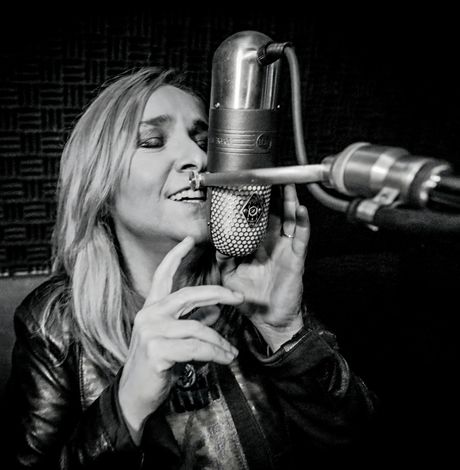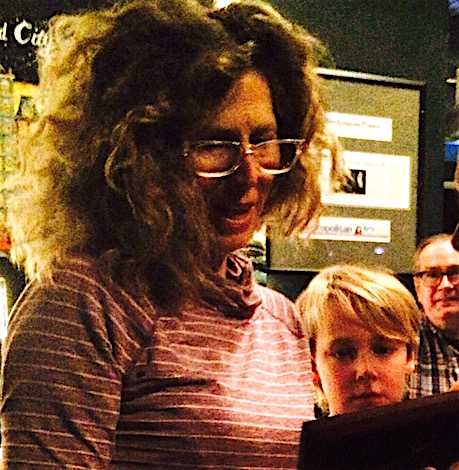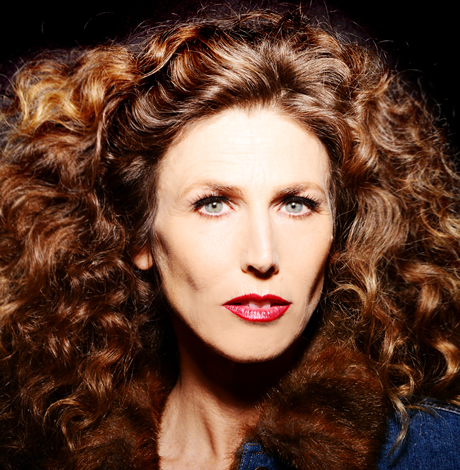Arts & Entertainment
Sophie’s choice
‘90s hitmaker returns after seven years with new album
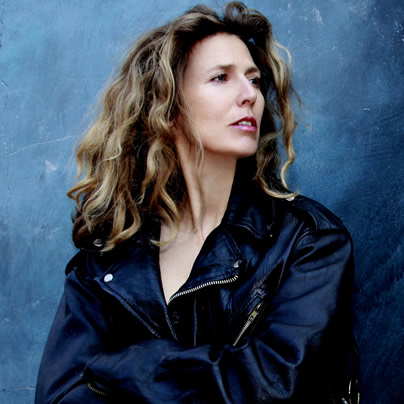
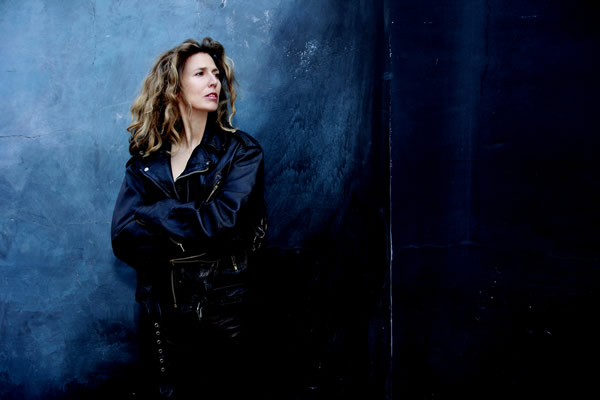
Sophie B. Hawkins released her first studio album in seven years last week. (Photos courtesy Trumpet Swan Entertainment)
How hard is it in this day and age to bounce back from a pop music career misstep? One likes to think pop culture — America ultimately voting with its pocketbook of course — eventually rewards and rediscovers the deserving.
One thinks of Kelly Clarkson who managed a comeback after the ill-advised downer (though it still went Platinum) 2007 album “My December.” And love her or hate her, Mariah Carey beat the odds with the monster-selling “Emancipation of Mimi” after her epic “Glitter” failure (both film and soundtrack).
But what if your supposed misstep isn’t even a bad album? Sophie B. Hawkins was well on her way to establishing distinguished career by the end of the ‘90s. She was red hot right out of the gate — “Damn I Wish I Was Your Lover,” which hit No. 5 on the Billboard Hot 100 in 1992, is a defining song of the era. She was nominated for the Best New Artist Grammy that year (co-nominated with Billy Ray Cyrus, Kriss Kross and Jon Secada; Arrested Development won). She survived the sophomore jinx with another mammoth hit “As I Lay Me Down,” a VH-1 staple from her second album “Whaler” that peaked at No. 6 during a 44-week run on the Hot 100 and a whopping 67 weeks (six at No. 1) on the AC chart. Unless you were in a convent that year, you heard it many, many times.
With that kind of start, the sky was conceivably the limit and expectations ran extremely high for her 1999 follow-up, “Timbre.” But trouble loomed — it’s a famous story, actually: Hawkins’ then label (Sony) only reluctantly released first single “Lose Your Way” with a banjo accompaniment. They argued it was poison for pop radio. Hawkins said it was essential. Though re-released independently in 2001 and followed by an indie follow-up called “Wilderness” in 2004, Hawkins lost her commercial, but not her artistic, footing. “Wilderness” turned out to be an unfortunately apt title — she spent years wandering.
Perhaps this wasn’t a total surprise, though. Anybody who’d paid attention knew Hawkins had a wild streak. She shimmied and writhed like a woman possessed on her duet with Melissa Etheridge on the latter’s VH-1 special in 1995 with a slate of then-hot female singer/songwriters like Joan Osborne, Jewel and Paula Cole. Those who caught Hawkins in concert knew of her penchant for the unconventional. As her audiences got smaller, her jeans got more shredded, her stream-of-consciousness stage meanderings more fluid. She wrangled memorably with Howard Stern about why she doesn’t shave her legs.
Though she’s long shunned labels for sexual orientation, the fact that she’s been in a same-sex relationship with filmmaker Gigi Gaston for several years (Gaston’s “The Cream Will Rise” follows Hawkins on an early tour) is one of the more conventional aspects of her persona. And it’s easy to forget that her wildly eclectic albums are full of intricately crafted and sometimes epic, sometimes disarming power pop that at times rivals Joni Mitchell’s best stuff for complexity and lyrical depth — check out “Mysteries We Understand,” “Only Love” “Help Me Breathe” and “I Need Nothing Else” especially.
Her hit singles are only part of the story. An early MusicHound review said, “Dig (further) than (the hits) and her abilities to seamlessly weave in and out of jazz, folk and dance, all driven by a kind of tribal percussion sensibility (emerge).”
But Hawkins, now 44, is starting to sound her age. Not vocally — her singing still has the luster that struck her chart gold all those years ago, but her insights during an hour-long phone chat last week show a woman who’s thought long and hard about life, pop culture popularity cycles, music making in the Internet age and much more. With no apparent time constraints, Hawkins gamely goes anywhere the questions take her and beyond, from hair tips and why she’s a dog person to the deeper story behind the banjo battles and her still-complicated relationship with her mother (explored memorably in “Cream”). The impetus for all this is her interminably delayed new album “The Crossing,” her first collection of new material in seven years, which dropped last week.
“People were always telling me, ‘Oh, you sold out with ‘Tongues and Tales,’ or, ‘Oh, you sold out with ‘Whaler.’ I’m not saying ‘Tongues and Tales’ was just art for art’s sake, but that was really the best I could to try and reach people,” Hawkins says. “Those albums were the least weird I could possibly be. You want your music to reach people, you want it to get out there to as many as possible, otherwise it’s too isolating. It’s like masturbation, you’re not doing it with anybody.”
Hawkins considers herself part of a group of ‘90s women singer/songwriters — she mentions Paula Cole and Tori Amos as peers — who barely “squeezed through” the music industry gate before the doors shut altogether, from the advent of file sharing to endless label buyouts that left precious few major players in the game. Yes, there are still women hitmakers — Rihanna, Adele — but they’re few and far between and getting younger all the time.
“I think everybody knew what was going to happen, the chilly winds were already blowing,” she says. “I felt with the first album like, ‘Wow, I really got away with something’ in spite of all this. Then with ‘Whaler’ it felt like that again, although that was really the beginning of the fight. … In the ‘90s, it really started turning against the individual artist into this totally corporate thing in every way. It was like, ‘Oh, I’m with this group, I’m with that group, this is Sophie’s sound, this is the lesbian sound, the country artist, the right wing, the left wing — I feel like several of us just barely squeaked through in spite of all that.”
And yes, some of that line of thinking is what’s led Hawkins to shun traditional LGBT labels.
She admits she and Gaston have been in an exclusive relationship (Gaston is also her manager), but says a lack of general perception of nuance causes her to avoid certain language.
“It’s because nobody listens,” Hawkins says. “They just want to say it, and shut up and not hear any more about it. I love the word bisexual but it has such a negative connotation, I don’t know why. It’s like this big, scary thing for people so I’ve tried to come up with something that’s what I really think I am … I’m definitely not heterosexual or homosexual, I love men and women equally and passionately. I’m just having a relationship right now with a woman and I think there are very few men I could have a relationship with. I’m a very singular person. I’m committed to this woman, but if I were not, I’d probably be alone.”
The years since “Wilderness” have not been inactive for Hawkins. She became a mother — her son with Gaston, Dashiell, is 3. She popped up at the Grammys pre-show as a presenter, campaigned avidly for Hillary Clinton’s presidential campaign, released several singles along the way including one (“The Land, the Sea and the Sky”) as a benefit for the Waterkeeper Alliance, an environmental group.
She released a live album and her song “Life is a Bomb” was on the soundtrack for the 2011 Garry Marshall film “New Year’s Eve,” a feat Hawkins says was wildly against the odds. She also tweaked “The Crossing” endlessly as the years went by and various proposed release dates came and went. Hawkins says it’s “a miracle” the album came out at all.
She also worked with Gaston on a musical for Kristin Chenoweth that’s on hold until Chenoweth’s producer of choice is available and she has high hopes for an October musical in Los Angeles (Hawkins lives in Venice, Calif., and has been on the West Coast for more than a decade) in which she’ll star as Janis Joplin.
Hawkins says she knew instinctively, she was supposed to do the Joplin piece.
“My reaction was just, ‘Yes,’ and I never say yes to anything right away. I just think there’s something I can do with Janis that will speak to every creative person out there who feels overlooked or treated in a way that’s not fair. … If we can get this ball in the basket, I have a good feeling about this, I think it could be a slam dunk. It will be so relevant to now, it really gives me a freedom I cannot even tell you.”
Hawkins guesses, counting the Chenoweth musical and “The Crossing” material, she’s written about 300 songs in the last seven years. The album will include acoustic remakes of “Damn” and “As I Lay Me Down.” Hawkins has a distribution deal with EMI for the release.
Hawkins says she’s a huge dog lover because she could never have one as a kid. She loves them because there’s “no barrier” to their affection and presence.
Of her trademark abundant tresses, Hawkins says her only hair care tip is to avoid washing it as much as possible. She insists hers looks best when it’s been weeks since the last shampoo.
“That’s when I always get the most compliments, people saying ‘Oh, you have such great hair.’”
She’s also realistic about “The Crossings” commercial prospects. She says she’ll never stoop to giving her music away but realizes the chances of duplicating her early chart success are practically nil.
On one hand, Hawkins says her art (she paints too) is something she “couldn’t not do.” Conversely, she says it’s Gaston who has urged her to continue against increasingly difficult industry and commercial odds.
“She’s so much more than a manager,” Hawkins says. “Things bother her more than they bother me. Oh, believe me, I would have just gone away by now and written and painted by myself if it weren’t for her. I don’t think I could have survived but she tells me, ‘You’re not giving up, you’re a great artist, it kills me that people don’t see this.’ She really takes it on as one of her missions.”
So in hindsight, was the banjo battle worth it?
Hawkins says the story has gotten oversimplified as a kind of cautionary tale for supposedly overambitious pop singers — as in, “Remember Sophie B. Hawkins? Look what happened to her.”
She says it was more an issue of increasing pressure to write songs in huge groups of collaboration Hawkins found unwieldy and artistically stifling. She says she would have agreed to remove the banjo line for the radio version and kept it on a remix or B-side version (“Believe me, all those scenarios were discussed”), but push came to shove when label execs put their foot down over her using it for a live TV appearance.
“It was really the straw that broke the camel’s back,” she says. “It was such a clear thing to me. They were taking away my horse, in a way. I thought, ‘I can’t ride into battle without my horse. I can’t win without the horse.’ It just made me realize we weren’t on the same team anymore. … They were no longer rooting for me to win, they were trying to destroy me.”
Hawkins says she’s learned to find rewards in non-traditional places. Even though her relationship with her mother is still every bit as complicated as it was portrayed in “Cream,” Hawkins says there are sparks of healing and inspiration there too.
“There are artistic people out there struggling who never make at all,” she says. “So when somebody tells me they get it, it’s like winning an Oscar. My mother called me the other day and told me she’d listened to the new album. She said she’d felt it, whatever it was, this profound thing in the music. If your parents are alive and you get that, that’s my Grammy.”
Television
ICYMI: ‘Overcompensating’ a surprisingly sweet queer treat
A sweet, savvy show about breaking free to embrace your true self

Pride month 2025 is now behind us, and while it’s safe to say that this year’s celebrations had a darker edge than usual, it’s also true that they came with a particularly rich bounty of new queer movies and shows to entertain us – so many, in fact, that even if we are facing a lull until the fall another harvest of fresh content, there are still plenty of titles – which, for whatever reason, were off your radar – for you to catch up on in the meantime.
One of the most notable of these – the bingeworthy series “Overcompensating” (now streaming on Amazon Prime) – will most definitely have been ON the radar for the plentiful fans of creator and star Benito Skinner, the actor/comedian who rose to viral fame through his content on platforms like Instagram, YouTube, and TikTok. For anyone else, it might have easily slipped through the cracks.
Created and written by Skinner as a loosely autobiographical “college comedy,” it aims for the kind of raucous, explicitly sexed-up tone one expects from the genre as it centers on Benny (Skinner), newly arrived as a freshman at prestigious Yates University. A former football jock and “golden boy” at his midwestern high school, he’s the picture of idealized youthful masculinity; he’s also deep in the closet, struggling to keep his sexuality hidden and maintain his macho front under the intense scrutiny of the college’s social scene – and under the resentful eye of his older sister Grace (Mary Beth Barone), who has already secured her own place at the top of the pecking order.
In the first episode, Benny’s difficulties are eased when he meets Carmen (Wally Baram), another freshman trying to navigate the politics of college life; a gamer from a home marred by tragedy, she’s an outsider who feels like she’s putting on an act, too, and they click – giving him the convenient “cover” of female companionship while providing them both with much-needed support and encouragement. He’s also befriended by a handsome film major from England (Rish Shah), who has already caught his eye, stirring other kinds of feelings and possibly even reciprocating them. Meanwhile, he’s being courted by the school’s “exclusive secret society” – headed by his sister’s aggressively “alpha” boyfriend Pete (Adam DiMarco) – and trying to stay interested in his studies, despite a growing realization that a career in business doesn’t actually appeal to him all that much.
That’s a lot to juggle for anybody, even an overachiever like Benny – whose “lucky” life so far has largely been the result of playing a role he is finding harder and harder to maintain. As the series goes on through its eight-episode arc, it becomes clear that he’s not the only one who is “keeping up appearances,” and he, along with the other confused and damaged young people in his orbit, begins the painful (but often hilarious) process of evolution that is required in order to become truly oneself.
Directed toward appealing to a younger demographic, “Overcompensating” is the kind of show that requires a few episodes worth of invested time to make an impression that feels like substance. Full of the bawdy farcical antics that go hand in hand with stories about hormonally charged college kids, it’s not above leaning into the formulas and tropes that have always driven these kinds of comedies. At first, while its broadly comedic strokes and frequently explicit sexual hijinks might elicit plenty of chuckles, the show might easily feel tiresome for more mature audiences; there’s a nostalgic fun to it, made even more appealing, somehow, by the “political incorrectness” of its frequently sexist and homophobic humor, but for a while things may feel like an unnecessary attempt to reinvent “Animal House” for the Gen Z crowd.
By the time the season reaches its halfway point, however, things have started to get real. The antics of these horny almost-adults take on a more pointed absurdity, informed by the increasingly tangled web of defensive deceit they weave among themselves – and, as things draw toward a cliffhanger climax, the consequences of maintaining it – until it achieves a sense of empathy toward them all. There’s a wisdom that smacks of lived authenticity underlying the whole affair, transforming it from the “sexploitative” teen comedy of its surface into something deeper. To be sure, things stay expectedly wacky, and the soap-operatic melodrama of its twists and reversals continue to maintain the show’s “mature YA” appeal; but beneath those trappings, by the end of the season a truer identity has begun to emerge, just as its characters have begun to find their own levels of self-actualization for themselves.
As creator, primary writer, and star, it’s obviously Skinner who deserves much of the credit. While it might be tempting, early on, to dismiss the show as an “ego project,” the internet-spawned sensation proves his talents quickly enough to get past such judgy suspicions, delivering a pitch-perfect blend of sauciness and sensitivity that extends its appeal toward both ends of the taste spectrum; just as crucially, he brings the same aforementioned “lived authenticity” to his winning performance – after all, he’s essentially playing himself in a fictionalized version of his own life – while also making sure that equal time (and compassion) is afforded all the other characters around him, each of whom are pushing at the boundaries of their own respective “closets,” too. It’s unavoidable to notice that – like most of his co-stars – he’s plainly a decade too old to be playing a college student; but by the time we reach that crucial halfway turning point, we’ve become too engaged by him to care.
The show is full of excellent performances, in fact. Relative newcomers Baram and Barone offer layers of complex nuance, while the more familiar DiMarco (“White Lotus”) is close to heartbreaking as the toxic BMOC clinging to the illusion of power as his life begins unraveling around him. Other standouts include the mononymic actress Holmes as Carmen’s “wild child” roommate, solidly likable turns as Benny’s parents from mature veterans Connie Britten and Kyle MacLachlan (whose presence, along with stylish elements in several key scenes, hints at an homage-ish nod to the late David Lynch), and podcaster Owen Thiele as an openly gay fellow student who has Benny “clocked” from the moment they meet. Finally, Lukas Gage makes a deep impression as a former high school teammate at the heart of Benny’s most haunting memory.
There’s no official word yet on whether “Overcompensating” will be renewed for a second season, despite the multiple loose ends left dangling at the end of its first; it has proven to be popular, and Skinner’s large fanbase makes it likely that the story will continue. Even if it doesn’t, the place of uncertainty in which it has left its characters rings true enough to serve as a satisfying endpoint.
As for us, we hope that won’t happen. For all its sophomoric humor, generic plot twists, and purposefully gratuitous sexual titillation, it’s one of the sweetest, kindest, and most savvy shows we’ve seen about breaking free from conformity to embrace your true self – and that’s a message that applies whether you’re queer, straight, or anywhere in between.
Photos
PHOTOS: Independence Day Weekend in Rehoboth
Wicked Green Pool Party, fireworks among festivities

Vacationers and residents alike enjoyed Independence Day Weekend activities in Rehoboth Beach, Del. The Wicked Green Pool Party drew hundreds to the CAMP Rehoboth fundraiser on Saturday. That evening, revelers went to the rooftops to watch the fireworks display.
(Washington Blade photos by Daniel Truitt)













Music & Concerts
Red, White, and Beyoncé: Queen Bey takes Cowboy Carter to D.C. for the Fourth of July
The legendary music icon performed on July 4 and 7 to a nearly sold-out Northwest Stadium.

Just in time for Independence Day, Beyoncé lit up Landover’s Commanders Field (formerly FedEx Field) with fireworks and fiery patriotism, bringing her deeply moving and genre-defying “Cowboy Carter” tour to the Washington, D.C. area.
The tour, which takes the global icon across nine cities in support of her chart-topping and Grammy-winning country album “Cowboy Carter,” landed in Prince George’s County, Maryland, over the Fourth of July weekend. From the moment Beyoncé stepped on stage, it was clear this was more than just a concert — it was a reclamation.
Drawing from classic Americana, sharp political commentary, and a reimagined vision of country music, the show served as a powerful reminder of how Black Americans — especially Black women — have long been overlooked in spaces they helped create. “Cowboy Carter” released in March 2024, is the second act in Beyoncé’s genre-traversing trilogy. With it, she became the first Black woman to win a Grammy for Best Country Album and also took home the coveted Album of the Year.
The record examines the Black American experience through the lens of country music, grappling with the tension between the mythology of the American Dream and the lived realities of those historically excluded from it. That theme comes alive in the show’s opening number, “American Requiem,” where Beyoncé sings:
“Said I wouldn’t saddle up, but
If that ain’t country, tell me, what is?
Plant my bare feet on solid ground for years
They don’t, don’t know how hard I had to fight for this
When I sing my song…”
Throughout the performance, Beyoncé incorporated arresting visuals: Black cowboys on horseback, vintage American iconography, and Fox News clips criticizing her genre shift — all woven together with voiceovers from country legends like Dolly Parton and Willie Nelson. The result was a multimedia masterclass in storytelling and subversion.
The “Cowboy Carter” tour has been a social media sensation for weeks, with fans scrambling for tickets, curating elaborate “cowboy couture” outfits, and tailgating under the summer sun. At Commanders Field, thousands waited in long lines for exclusive merch and even longer ones to enter the stadium — a pilgrimage that, for many, felt more like attending church than a concert.
One group out in full force for the concert was Black queer men — some rocking “denim on denim on denim on denim,” while others opted for more polished Cowboy Couture looks. The celebration of Black identity within Americana was ever-present, making the concert feel like the world’s biggest gay country-western club.
A standout moment of the night was the appearance of Beyoncé’s 13-year-old daughter, Blue Ivy Carter. Commanding the stage with poise and power, she matched the intensity and choreography of her mother and the professional dancers — a remarkable feat for someone her age and a clear sign that the Carter legacy continues to shine.
It’s been nearly two decades since Beyoncé and Destiny’s Child parted ways, and since then, she’s more than lived up to her title as the voice of a generation. With “Cowboy Carter,” she’s not just making music — she’s rewriting history and reclaiming the space Black artists have always deserved in the country canon.
-

 Federal Government2 days ago
Federal Government2 days agoTreasury Department has a gay secretary but LGBTQ staff are under siege
-

 Virginia3 days ago
Virginia3 days agoDefying trends, new LGBTQ center opens in rural Winchester, Va.
-

 District of Columbia2 days ago
District of Columbia2 days agoGay GOP group hosts Ernst, 3 House members — all of whom oppose Equality Act
-

 Opinions4 days ago
Opinions4 days agoUSAID’s demise: America’s global betrayal of trust with LGBTQ people

